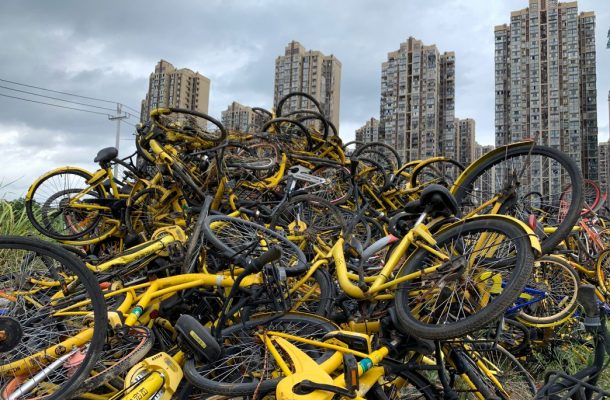Why Asia needs to rethink the ‘sharing economy’

Once celebrated as exemplars of the ‘sharing economy’, China’s bike-sharing companies rapidly filled Chinese cities with bikes. But millions of abandoned bicycles now litter and clog public spaces.
In the Philippines, enterprising Filipinos are buying new cars for ‘ride-sharing’. Car dealers even cite ride-sharing as the reason behind increasing car sales, which may conceivably worsen Manila’s traffic congestion.
In Japan, international investors are buying properties to rent on Airbnb, even though many Japanese neighbourhoods have decried the intrusion of home-sharing guests into their residential areas.
What is popularly called the ‘sharing economy’ has done a lot of good and reached tremendous heights in Asia. GoJek and Grab added US$6.6 billion to Indonesian GDP in 2018. The size of China’s sharing economy was estimated to have reached US$438 billion in 2018.
Sharing economy companies, also known as platform companies, have unlocked new sources of income for many informal workers, the underemployed and marginalised. Users have found it easier to access superior services ranging from transport to delivery and temporary accommodation.
In What Is Mine is Yours, Rachel Botsman and Roo Rogers show that in a sharing economy, underutilised capacity is shared through technology platforms. This relieves the burden of buying and maintaining new assets. Other conceptions emphasise that access to assets rather than ownership is key. Evoking the imagery of collaboration and sharing, the ‘sharing economy’ has garnered a moral force that companies like to associate themselves with.
But when an asset is acquired purposefully for profit-oriented activities, is it still ‘sharing access’ or simply ‘selling access’? When bikes were added to China’s bike-sharing networks, they were purchased as assets precisely to be rented repeatedly.
This is a bike rental network, not a sharing system. A car bought for profit may be used occasionally in car-pooling services and this may seem like sharing. But that capacity would not exist if it was not bought for ride apps in the first place. Airbnb properties in Japan are bought by investors who do not even live in Japan.
In these instances, ‘underused capacity’ is not magically utilised. Instead, new capacity is added to the system. Despite this, the sharing economy is widely used in business environments because it makes it easy for companies to portray themselves as sharing platforms and therefore virtuous.
When seen as part of the sharing economy, some firms gain access to government incentives schemes and private investment. When the Chinese government designated the sharing economy as a national priority in 2015, many so-called bike-sharing companies enjoyed tax breaks and an influx of investment. This created oversupply and waste disposal problems.
By signalling that exchange occurs in the spirit of sharing rather than traditional profit transaction, technology companies can occupy a legal grey zone. There may indeed be no enabling clauses in pre-existing regulation for sharing transactions or any prohibitive clauses against access or asset sharing. Companies have grounds then to operate unfettered by regulatory constraints.
By leveraging their credentials as collaborative technological entities, platform companies can angle for different treatment. For example, Manila’s amended ride-hailing directive does not require ‘ride-sharing’ cars in Manila to follow the rules of their taxi counterparts.
These include mandatory inspections and the maintenance of expensive workshop-garages. The platforms are also allowed to set prices more freely. Due to these differences in treatment, conflicts have raged between platform and traditional workers.
Virtuous labels may also obscure undesirable social consequences arising from the success of platforms. Unrestricted home-sharing may price out residents and create unwanted intrusions. New cars bought solely for platform work could conceivably add to severe pollution and traffic congestion in gridlocked Southeast Asian cities.
Competition from platforms has reduced the income of vulnerable conventional players. For example, at least 10 per cent of commuters in Hanoi, Jakarta, Singapore and Kuala Lumpur have shifted to ride apps, representing a sizeable income loss for incumbent taxi drivers.
Even if conventional players are being pushed out by platforms offering better value for users, the plight of so many disenfranchised incumbents could be a social problem deserving a government response.
The sharing economy brings sizeable economic benefits but governments must loosen regulation only in the presence of adequate safeguards and amendment mechanisms. There must be an efficient way of inserting bite-sized amendments that address emergent problems that loose regulations are unlikely to pre-empt.
Governments should set up special units to address citizens’ complaints. The presence of help desks for ride apps in the Philippines and Indonesian governments is a step in the right direction.
Government policies should reflect the fact that many participants in Asia’s sharing economy are vulnerable informal workers. Governments must ensure platform workers have adequate social protections such as pensions and health insurance.
Mechanisms must exist to ensure tax compliance. Signing up for national social protection schemes and tax registration can be included in the onboarding process on these platforms. The applicable tax rates should be set considering that the income of platform workers are often irregular and precarious.
Policymakers and academics must produce a better framework that explains the different properties of each transaction type and persuasively justifies why certain types deserve special treatment. This will solve disputes between technology firms and incumbent players.
The purpose of asset purchase can be used to determine whether the asset will be used for genuine sharing or profit-oriented platform work. A platform and its participants should be regulated based on the probability that the non-sharing component of their ecosystem has negative externalities. It is only fair for the platform and its participants to carry some of the burdens of these negative externalities or be compelled to mitigate them.
While the sharing economy has done a lot of good, it has acquired a virtuousness that it does not always deserve. As a consequence, platform companies acquire certain advantages. We must be vigilant in making sure these companies are walking the talk and are held responsible for mitigating their negative social impacts.
This article was published by The East Asia Forum.
Godofredo Ramizo Jr is a DPhil student at the Oxford Internet Institute. His research interests include platform economies, on-demand ride-hailing platforms in Southeast Asia, governance reform, and the developmental impact of technology.











